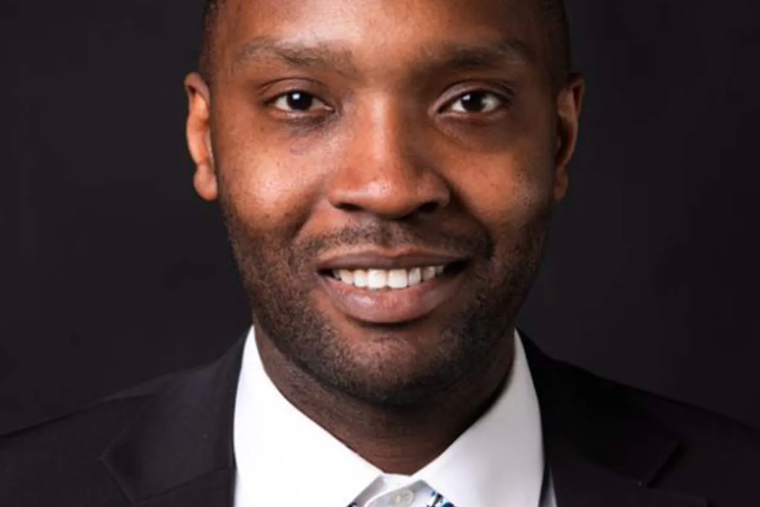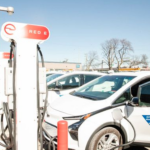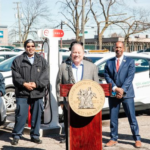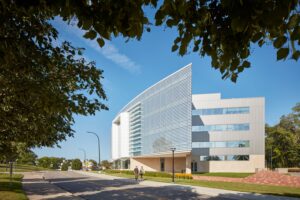
- Kim Kisner
- Community
- 04/25/2023
Opportunities for Sustainability Thrive in Detroit, Including Unused Land, Mobility Expertise and More

Jack Akinlosotu, Detroit’s new director of sustainability, sees sustainability opportunities in Detroit’s large geography, mobility industry focus, and other characteristics as he begins to immerse himself in the community.
Akinlosuto came to Detroit from Washington, D.C., where held posts at the Department of Energy and Environment (DOEE), the Clean Energy Institute, and in private industry. He also has held positions in New York City, San Francisco, and Seattle.
Immediately before coming to Detroit, he served as the senior product manager at Oracle Energy & Water, where he led partnership outreach and software development of the company’s product that helps utilities find, reach, and enroll limited-income customers in financial assistance and energy efficiency programs to lower their utility bills.
Previously, he worked as the energy program specialist at DOEE to coordinate multiple renewable energy projects, including community accessibility to solar power, electric vehicles, and green financing.
SBN Detroit spoke with Akinlosotu about his vision, how he’ll align strategies with the city’s Sustainability Action Agenda, and his top priorities in his new position.

Q: What role does environmental sustainability have for a city the size, scale, economy, and density such as Detroit and how will you approach it?
A: When I first came and visited Detroit I was surprised at the geographic scale. There is a lot of space and land. For a city this size to have this much unused land is unusual, and that provides opportunities here in terms of sustainability. There is ample space to scale, deploy and set up solar power and things like that.
Also, Detroit is the Motor City and is in a good position to be the frontrunner in the EV revolution. If we deploy EVs in smart ways we will continue Detroit’s history of being the leader in mobility and that’s a great opportunity for economic sustainability as well.
Q: What challenges do you foresee ahead of you, for your office, as you move ahead with a sustainable mission for the city?
A: The biggest challenge is making sure we are all hitting our climate goals. When it comes to scaling climate change, that’s a challenge every city faces. There is a lot of work to do and coordination and collaboration need to happen. We need to make sure all parties are in alignment for success, and some challenges come with this.
We also need to ensure that the people who have historically been left behind are included as part of the process.
Q: Conversely, what opportunities do you foresee? You are quoted as saying “There is a great deal of opportunity in Detroit to be more creative in developing lasting sustainability. The sustainability programs we need will be a transformative leap for Detroit.” What does this mean for the businesses and people of Detroit?
A: With all the work at hand there are significant opportunities to bring along a new workforce. For example, we need to work on making these older buildings and also residences energy efficient and we need a workforce to do that. We need to deploy and scale the use of solar energy and we need people to do that. There are a lot of opportunities to align climate goals with new jobs.
We also need to focus on putting programs in place – such as deploying renewable energy – that help people with limited income. I see this as an opportunity to build a more sustainable economy and more sustainable communities.
Q: How do you foresee working with businesses in the city to help them to become more sustainable? Or equitable?
A: It’s important that we all work together to help businesses in our region hit their climate goals. In addition to sustainability, there are a lot of financial upsides to making buildings more efficient so there are several “wins” here.
Q: What does the Sustainability Action Agenda look like now as you work to create a more sustainable Detroit where all Detroiters thrive and prosper in an equitable, green city and have access to affordable, quality homes?

A: There is work being done on many fronts to hit our goals and inform an updated Detroit climate strategy, including the following four key priorities:
-Electrification of the city’s vehicle fleet
-Transitioning municipal buildings to energy efficiency and
-Deploying solar and other measures of clean energy to help with decarbonization
-Focus on vulnerable communities and the city’s overall resilience
We are working to help vulnerable residents across Detroit by setting up resilience hubs for when there are outages and protecting homes with basement backup retrofits and things like this.
The Sustainability Action Agenda is informing the Detroit climate strategy and this work. And the goal is to work as fast as possible.
Q: What changes /impact do you expect to have made a year from now?
A: On a personal level, I’m new to the city and have been working to intentionally familiarize myself with the community by reaching out to individuals and groups who have been leading the on-the-ground work in their neighborhoods. My goal is to create good relationships so that I understand and hear their needs and what the residents and businesses want out of our plans. I look forward to executing these plans and being further ahead a year from now.
In terms of my responsibilities as the director, I plan to deploy as much renewable energy as possible within communities in the city. We will see that progress a year from now.
We will see more EV charging stations across the city, and a lot of that work is being done in this area now. The city recently converted its entire municipal parking department fleet of 48 vehicles to all-electric and has deployed four electric buses as part of the bus fleet conversion. We need to keep this momentum going, and we will.
Q: What does a successful collaboration between city departments and agencies look like for sustainable growth in the city?
A: Keeping all lines of communication open is going to be a critical aspect of this job. I attended the recent MI Healthy Climate Conference and talked to dozens of people there who shared their voices on improvements the city needs to be making. Input from all stakeholders is critical.
Q: How will you go about this?
A: There are many strong community groups across the city I’m in touch with. A lot of my work will be ensuring that these groups are involved early in the thought processes of plans. Detroit has a strong tradition of committed community leaders that have longstanding relationships in their communities. I am building relationships with these leaders to help drive input and output in terms of communication and collaboration between my office on the city level and residents.
Q: What work have you done in the past that will inform decisions in Detroit?
A: I’ve done a lot of work specifically relating to getting people with limited-income help in the way of integrating renewable energy programs and energy efficiency programs. I plan to proliferate this as much as possible and help limited-income people here.
There are a lot of similarities between Detroit and other cities I’ve worked with, and I see opportunities to involve people who have historically been left behind.
Be sure to subscribe to our newsletter for regular updates on sustainable business practices in and around Detroit.
Kim Kisner
- All
- Business
- Community
- Education
- Events

ZF Group, a global technology company with its North American headquarters in Northville, specializes in systems for passenger cars, commercial vehicles, and industrial technology. With a focus on next-generation mobility, the company develops solutions that address electrification, automation, and digitalization while aiming to improve safety, efficiency, and sustainability in transportation. SBN Detroit interviewed Anuj Shah, Sustainability Lead, for the Americas, to explore the most pressing environmental challenges in...

The Chip Bag Project, based in Detroit, is a sustainability initiative that upcycles hard-to-recycle snack packaging — particularly chip bags — into insulated sleeping bags for individuals experiencing homelessness. Founded by Eradajere Oleita, the project addresses both environmental waste and housing insecurity by transforming materials like Mylar into practical, thermally efficient solutions. In June, Oleita was among Trelllis’s 30 Under 30, its annual recognition of the brightest young...

PowerPanel, headquartered in Oxford, focuses on sustainable energy technology with a particular emphasis on hot water systems and thermal energy capture. The company designs and manufactures modular solar hybrid systems that integrate both photovoltaic and thermal components into a single unit. Its goal is to offer energy solutions that are more efficient, durable, and economically viable for a range of commercial and industrial applications. SBN Detroit interviewed Garth...







